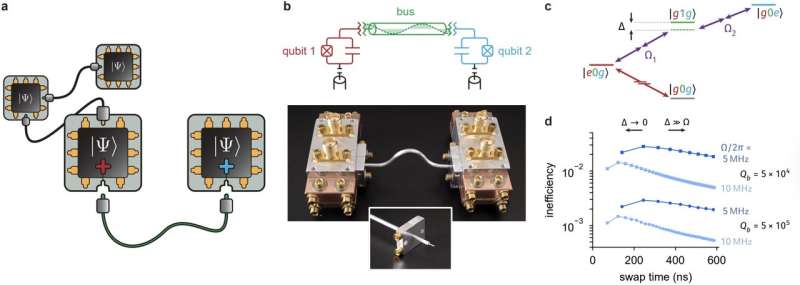Science
Researchers Unveil Modular Quantum Network for Enhanced Computing

Quantum computers, which leverage the principles of quantum mechanics to perform computations, are poised to surpass traditional computers in specific optimization and processing tasks. Despite significant advancements in quantum computing systems over recent decades, a major hurdle remains: efficiently scaling these systems to address real-world problems while simultaneously correcting computational errors.
Researchers at the University of Illinois at Urbana-Champaign have introduced a groundbreaking modular architecture aimed at scaling superconducting quantum processors. Their approach, detailed in a paper published in Nature Electronics on July 30, 2025, emphasizes a fault-tolerant and reconfigurable design necessary for maintaining essential quantum conditions during long-term computations.
New Modular Architecture for Quantum Processing
The proposed system consists of multiple superconducting qubit modules, each capable of independent operation. These modules can be interconnected through a low-loss interconnect to form an expansive quantum network. According to Wolfgang Pfaff, the senior author of the research, the team aimed to explore innovative ways to connect quantum devices while minimizing signal degradation during information transmission.
Pfaff explained, “The starting point for this study was current insight in the field of superconducting quantum computing that we will need to break out processors into multiple independent devices—an approach we call ‘modular quantum computing.’ This has become a widespread belief, and even companies like IBM are pursuing it.”
The researchers focused on developing a high-quality superconducting coaxial cable, referred to as a bus-resonator, which connects qubits with precision. The design allows for efficient gate operations between qubits and the cable, facilitating a rapid transfer of quantum information.
Advantages of the New Approach
The team’s initial tests indicated that their modular quantum network offers several advantages over traditional scaling methods. Notably, they demonstrated the capability to robustly connect and disconnect superconducting quantum devices without causing damage or introducing significant signal loss.
Pfaff stated, “Using our approach, I think that we have opportunities to build reconfigurable quantum systems from the bottom up, with the option to over time ‘plug in’ more processor modules to a network of quantum devices.” This flexibility could significantly enhance the scalability and practicality of quantum computing technologies.
The research team is currently designing a system to connect an increased number of elements, aiming to expand the potential of their modular networks. They are also exploring solutions to better manage losses within the system and ensure compatibility with quantum error correction protocols.
The findings from this study represent a significant step forward in the quest for scalable quantum computing solutions. As the field continues to evolve, the potential applications for these advancements could reshape various industries reliant on complex computations.
For those interested in further details, the full research can be accessed in Nature Electronics.
-

 Technology5 months ago
Technology5 months agoDiscover the Top 10 Calorie Counting Apps of 2025
-

 Health3 months ago
Health3 months agoBella Hadid Shares Health Update After Treatment for Lyme Disease
-

 Health3 months ago
Health3 months agoErin Bates Shares Recovery Update Following Sepsis Complications
-

 Technology4 months ago
Technology4 months agoDiscover How to Reverse Image Search Using ChatGPT Effortlessly
-

 Technology1 month ago
Technology1 month agoDiscover 2025’s Top GPUs for Exceptional 4K Gaming Performance
-

 Technology3 months ago
Technology3 months agoElectric Moto Influencer Surronster Arrested in Tijuana
-

 Technology5 months ago
Technology5 months agoMeta Initiates $60B AI Data Center Expansion, Starting in Ohio
-

 Technology5 months ago
Technology5 months agoRecovering a Suspended TikTok Account: A Step-by-Step Guide
-

 Health4 months ago
Health4 months agoTested: Rab Firewall Mountain Jacket Survives Harsh Conditions
-

 Lifestyle5 months ago
Lifestyle5 months agoBelton Family Reunites After Daughter Survives Hill Country Floods
-

 Health3 months ago
Health3 months agoAnalysts Project Stronger Growth for Apple’s iPhone 17 Lineup
-

 Technology4 months ago
Technology4 months agoHarmonic Launches AI Chatbot App to Transform Mathematical Reasoning





















